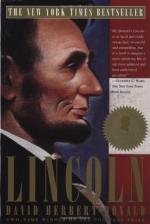
|
| Name: _________________________ | Period: ___________________ |
This test consists of 15 multiple choice questions and 5 short answer questions.
Multiple Choice Questions
1. What does Donald say Lincoln returned to with the Gettysburg Address?
(a) Habeas Corpus.
(b) Freedom of speech.
(c) Optimism.
(d) Making public proclamations.
2. How did Lincoln appease the border states?
(a) By separating abolition from the war for the Union.
(b) By taking more recruits from the north.
(c) By moving the fighting to the south.
(d) By moving the fighting to the North.
3. When did Lincoln present the Emancipation Proclamation to his cabinet?
(a) April 1863.
(b) October 1863.
(c) July 1863.
(d) September 1862.
4. How did Lincoln handle the question of emancipating the slaves?
(a) He made no question of his opposition to slavery.
(b) He kept his feelings to himself.
(c) He waffled on it.
(d) He told each party what they wanted to hear.
5. How did the war effort affect international relations?
(a) France was sending support to the Confederacy.
(b) While the Civil War raged, Mexico was threatening to retake territories it lost in the Mexican War.
(c) With so much attention on the war, the US was losing its trade advantages in Asia.
(d) France and Britain complained because they could not get Southern cotton.
6. What did the Battle of Antietam indicate for Lincoln?
(a) That he should change generals.
(b) That God smiled on the Union.
(c) That he should bolster his support before making any new offensives.
(d) That he should abandon emancipation for now.
7. What was the 10% plan?
(a) There could not be more than 10% of the slave population still in slavery for a state to re-enter the union.
(b) 10% of voters from the 1860 election had to have voted in any post-war election for it to be valid.
(c) A state's war reparations could not exceed 10% of its total income.
(d) Unrepentant Southerners could not occupy more than 10% of a state's cabinet positions.
8. How did the first major engagement with Southern troops change the public view of the war?
(a) The Union loss made people think that the war might go on for a long time.
(b) The Southern loss made people think that the war would be over quickly.
(c) The stalemate made people think that the war might go on for a long time.
(d) The Union loss made people think that the South might succeed.
9. How did the Civil War progress after initial Union losses?
(a) Union troops languished for lack of supplies.
(b) Southern troops began to falter for lack of supplies.
(c) Union troops began to win battles.
(d) Union troops suffered one disaster after another.
10. What did the Emancipation Proclamation do?
(a) Free slaves and give them reparations.
(b) Freed slaves in the north and in states in rebellion.
(c) Free all literate slaves.
(d) Free all slaves in North America.
11. What shift did Lincoln's letter to Greeley indicate in Lincoln's thinking?
(a) It showed that he was willing to punish the South after all.
(b) It made slavery the purpose of the war after all.
(c) It showed that he could act to protect mercantile interests after all.
(d) It showed that he was willing to punish the South after all. It showed that he could be influenced by mercantile interests after all.
12. Why did Lincoln ultimately appoint Halleck as General-in-Chief?
(a) He was more aggressive than McClellan was.
(b) He was not afraid to use freed slaves in his army.
(c) He was willing to punish the Southern slaveholders.
(d) He was not afraid to use freed slaves in his army.
13. Whom did the Democrats get to run against Lincoln?
(a) Horace Greeley.
(b) Ulysses Grant.
(c) Salmon Chase.
(d) McClellan.
14. What is considered the most controversial action Lincoln took during the Civil War?
(a) Replacing McClellan with Burnside.
(b) The suspension of habeas corpus.
(c) The burning of Atlanta.
(d) The Emancipation Proclamation.
15. What criticism was made of the Emancipation Proclamation?
(a) That it did not repair the injuries to African societies.
(b) That it did not free slaves in the Confederate states.
(c) That it did not give the slaves enough.
(d) That it did not punish slaveholders enough.
Short Answer Questions
1. How did Lincoln's strategy of appointing cabinet-members get him in trouble?
2. What prospect was beginning to open for Lincoln as he entered the third year of the war?
3. Who was Edward Stanton?
4. Who was the general in charge of Union troops at the beginning of the Civil War?
5. What was the occasion for the Gettysburg Address?
|
This section contains 760 words (approx. 3 pages at 300 words per page) |

|




